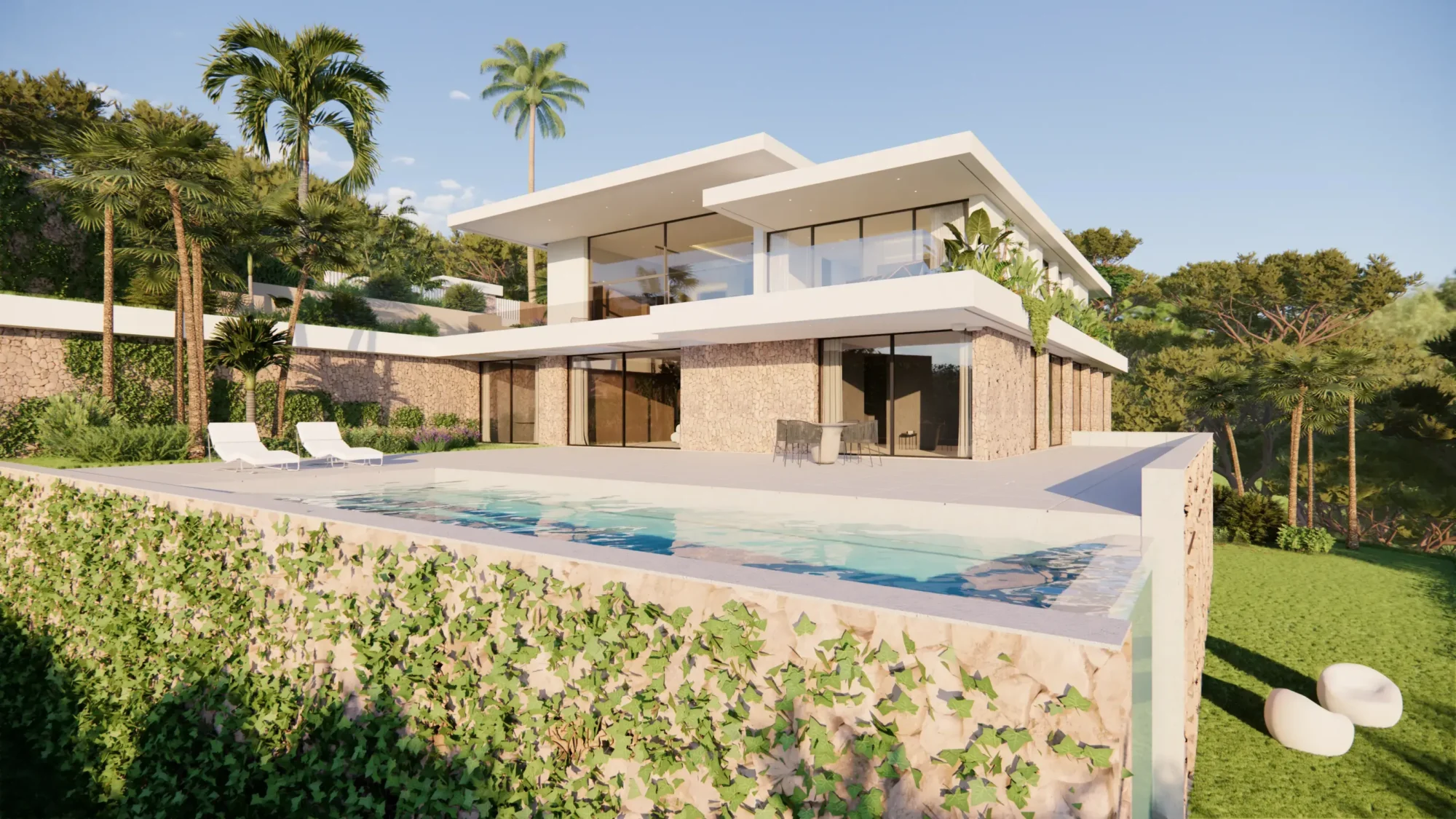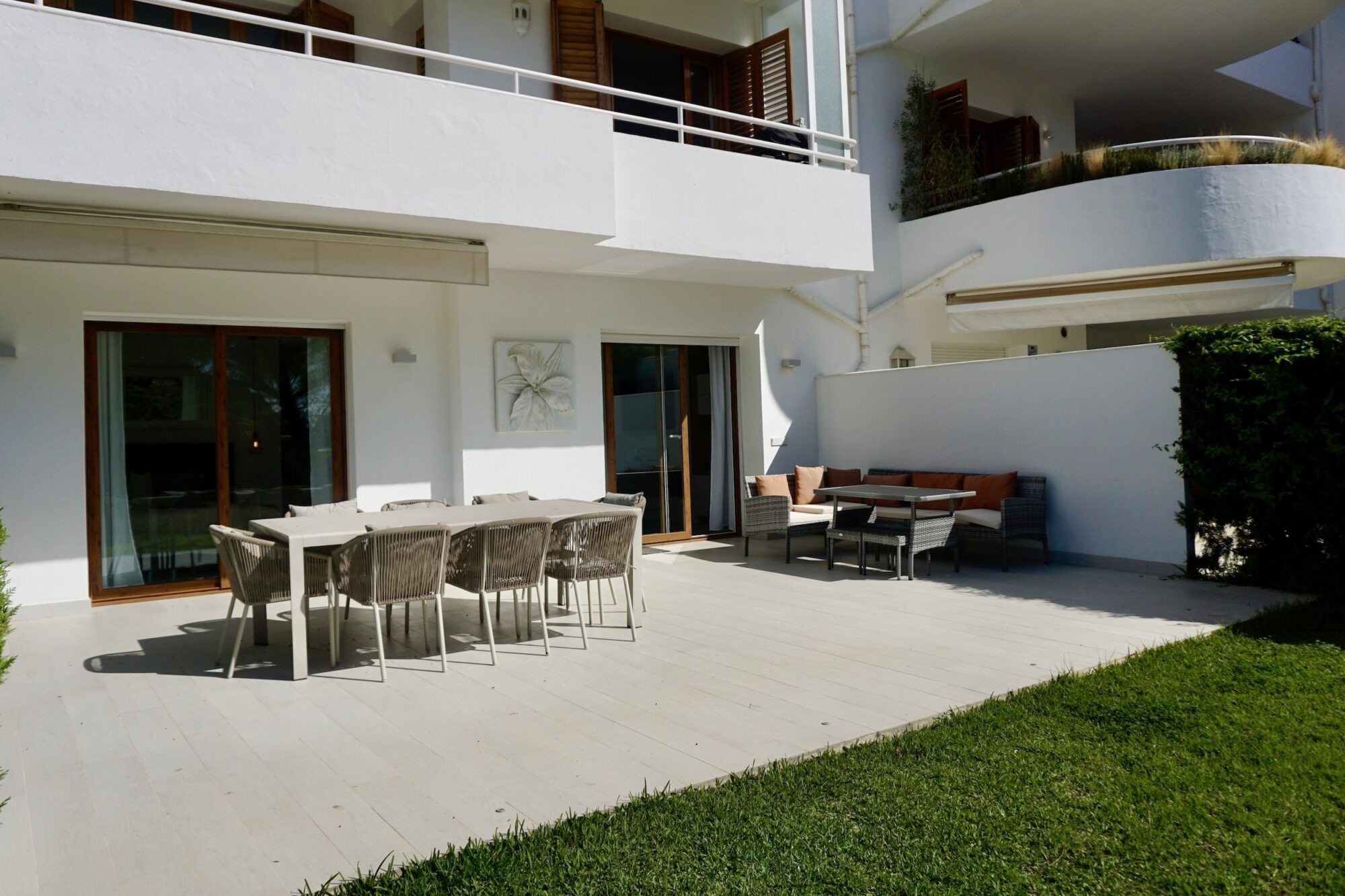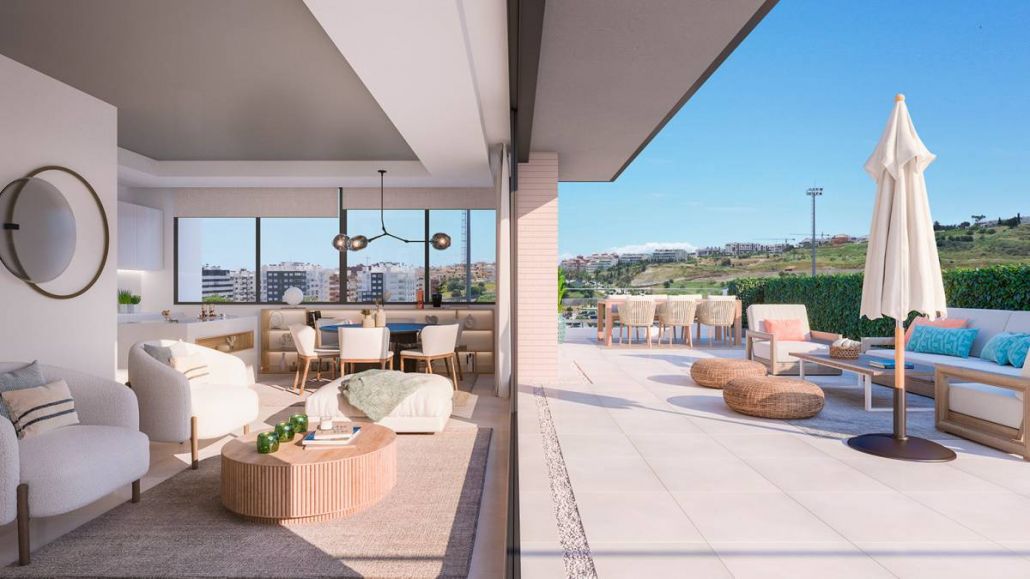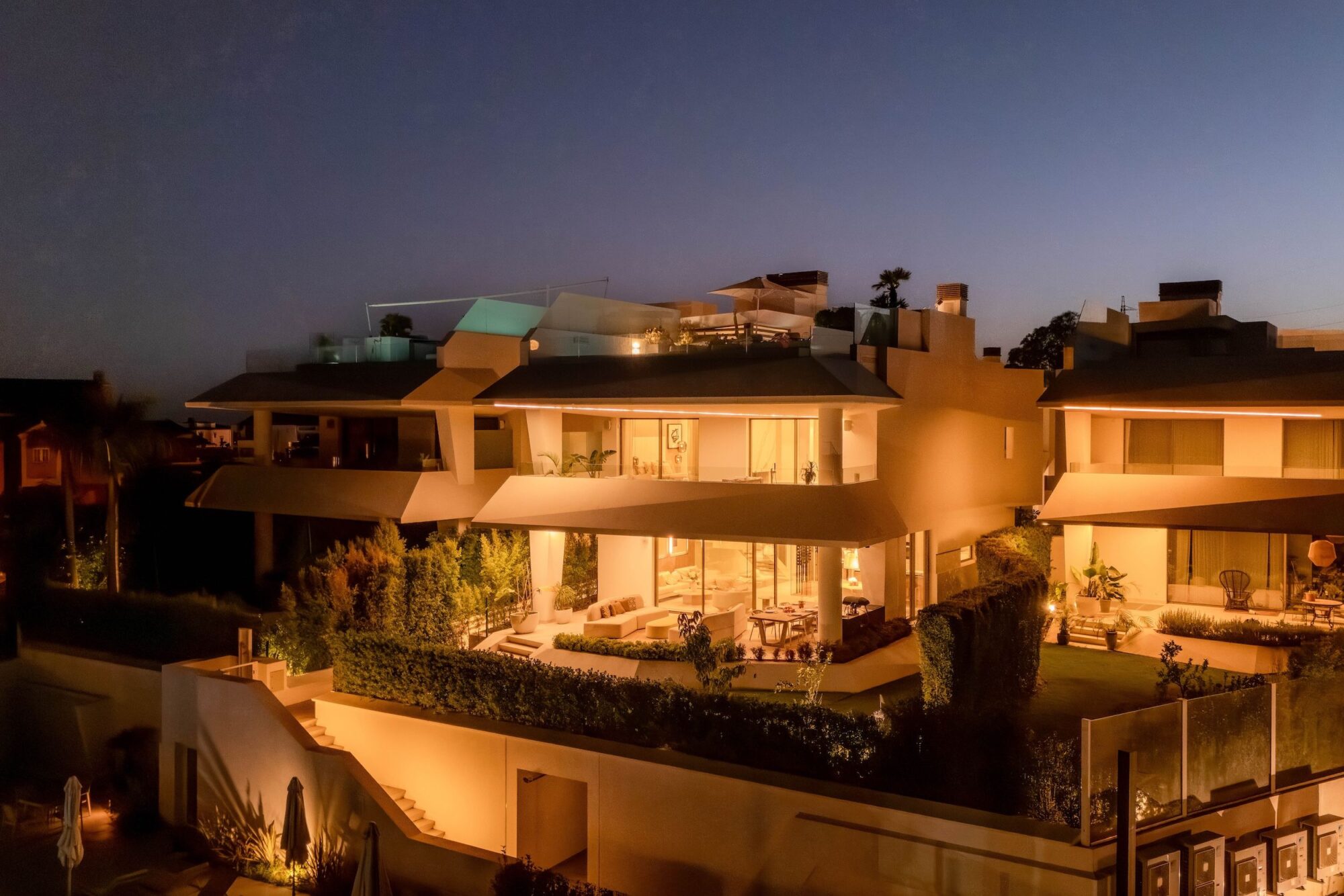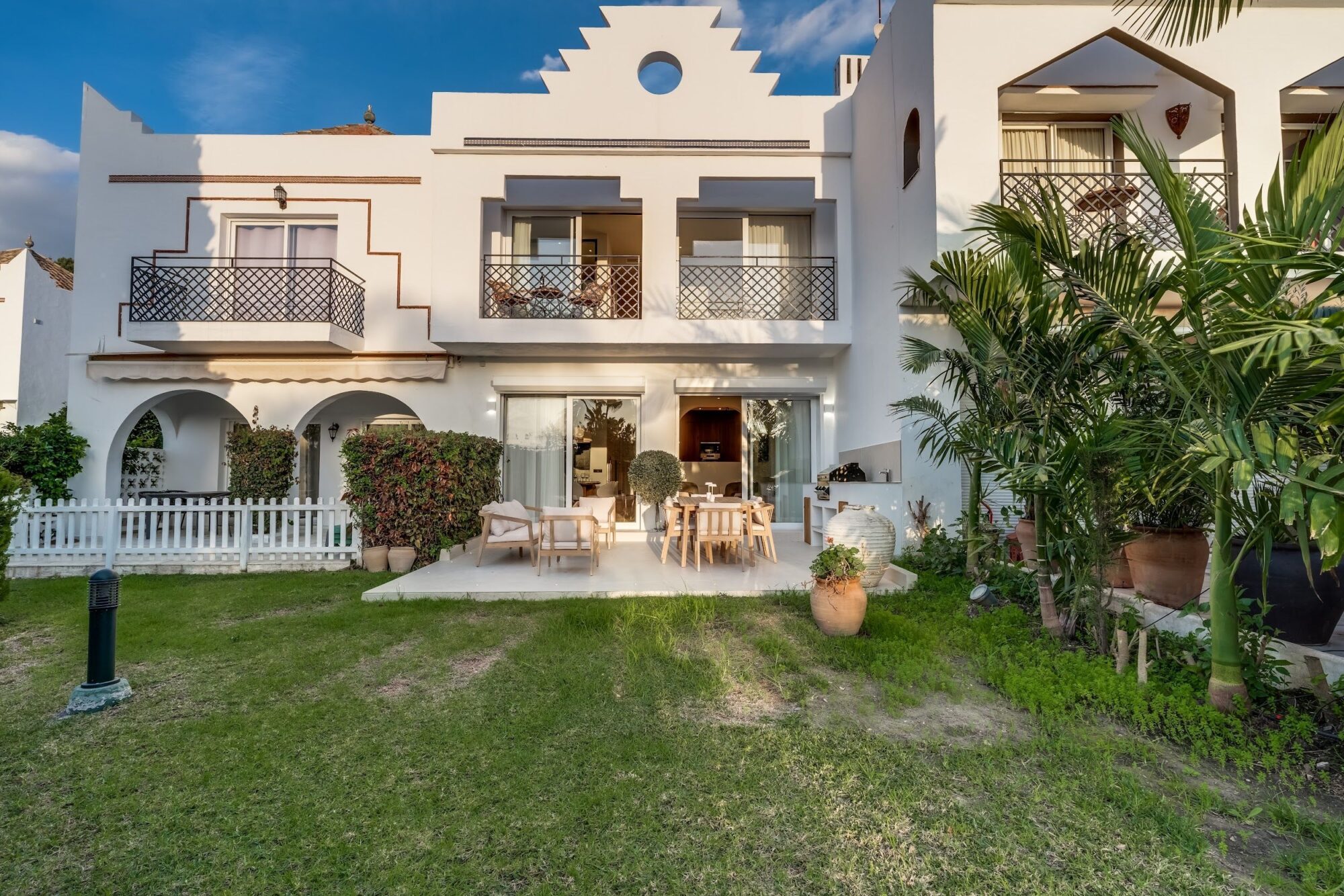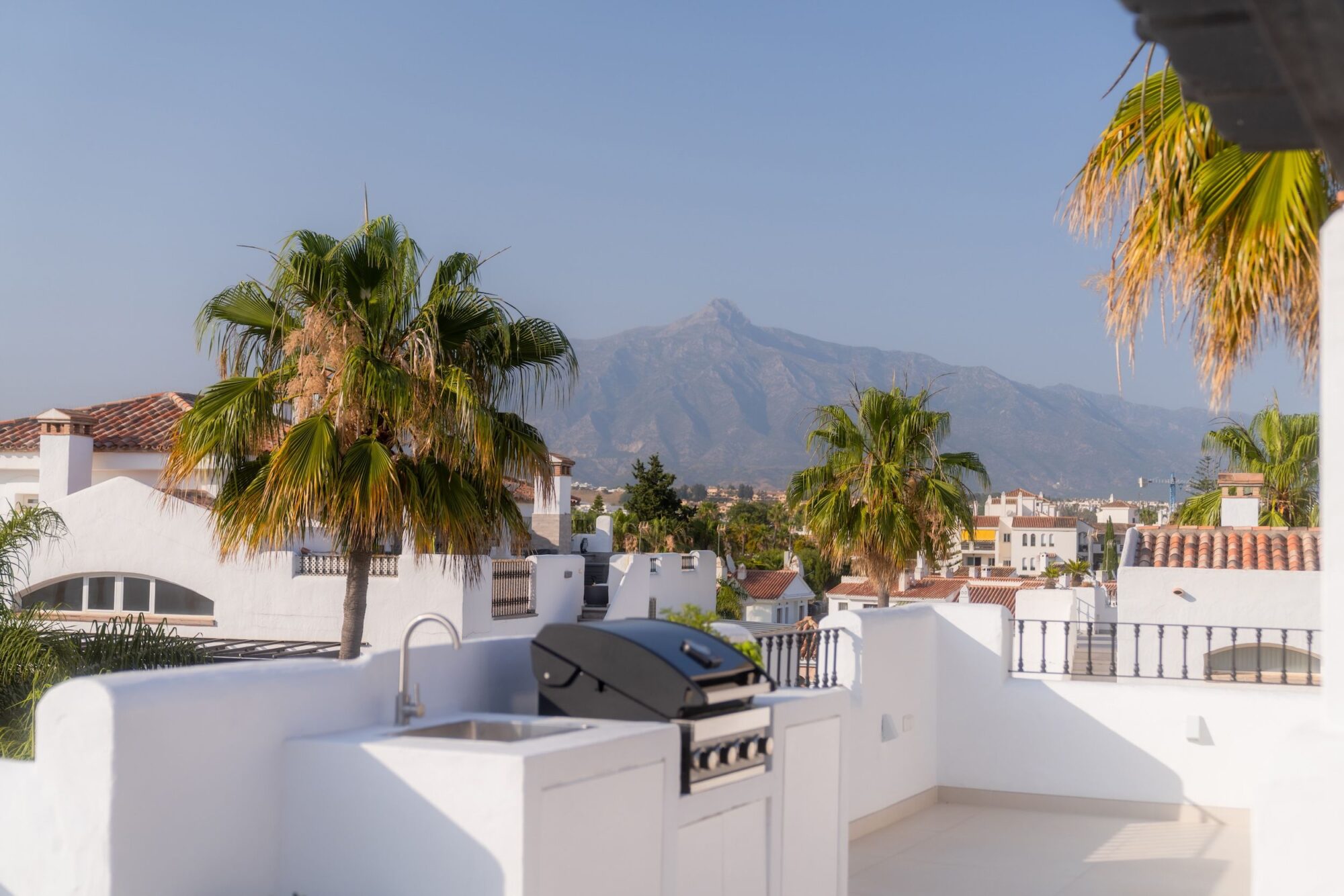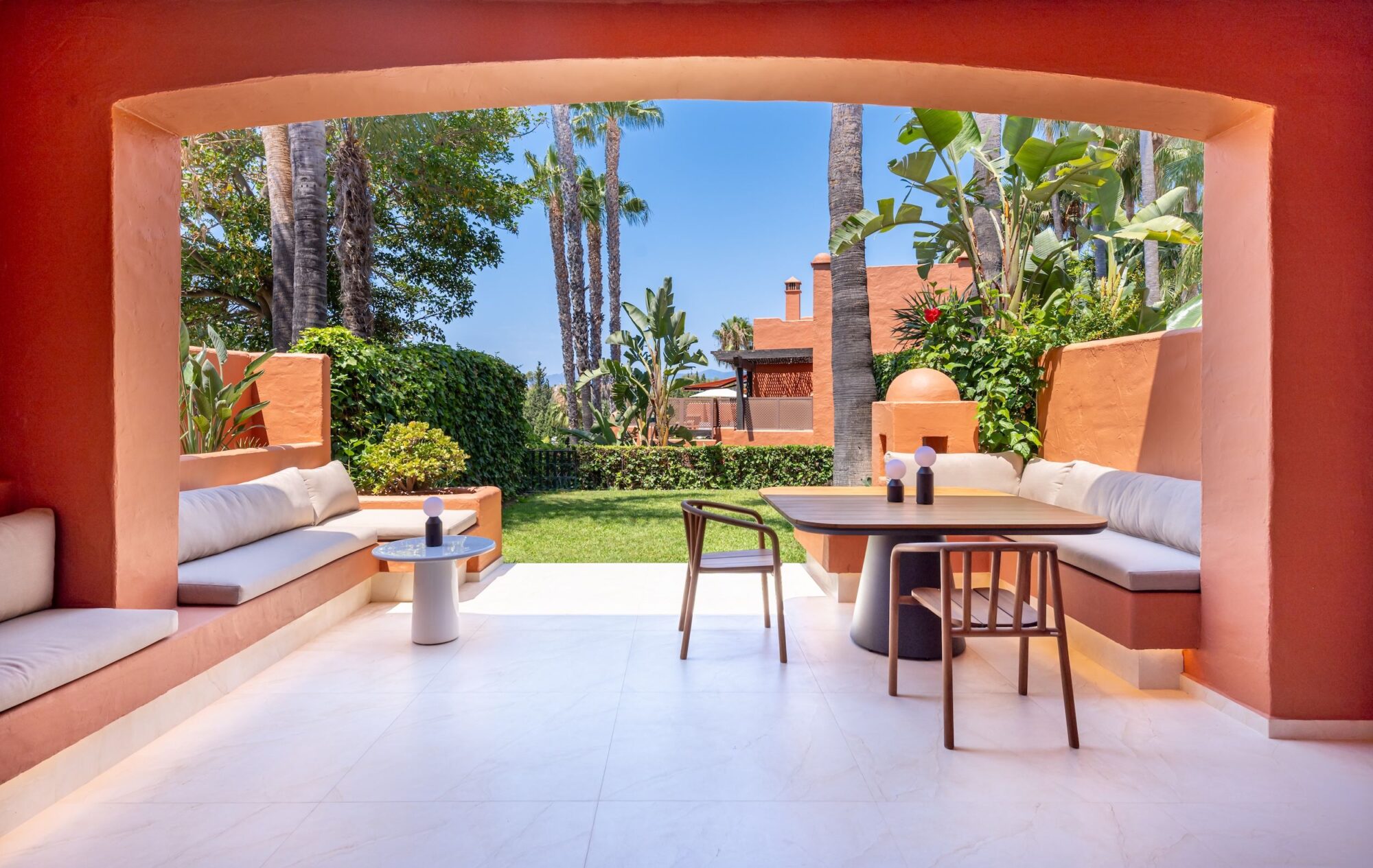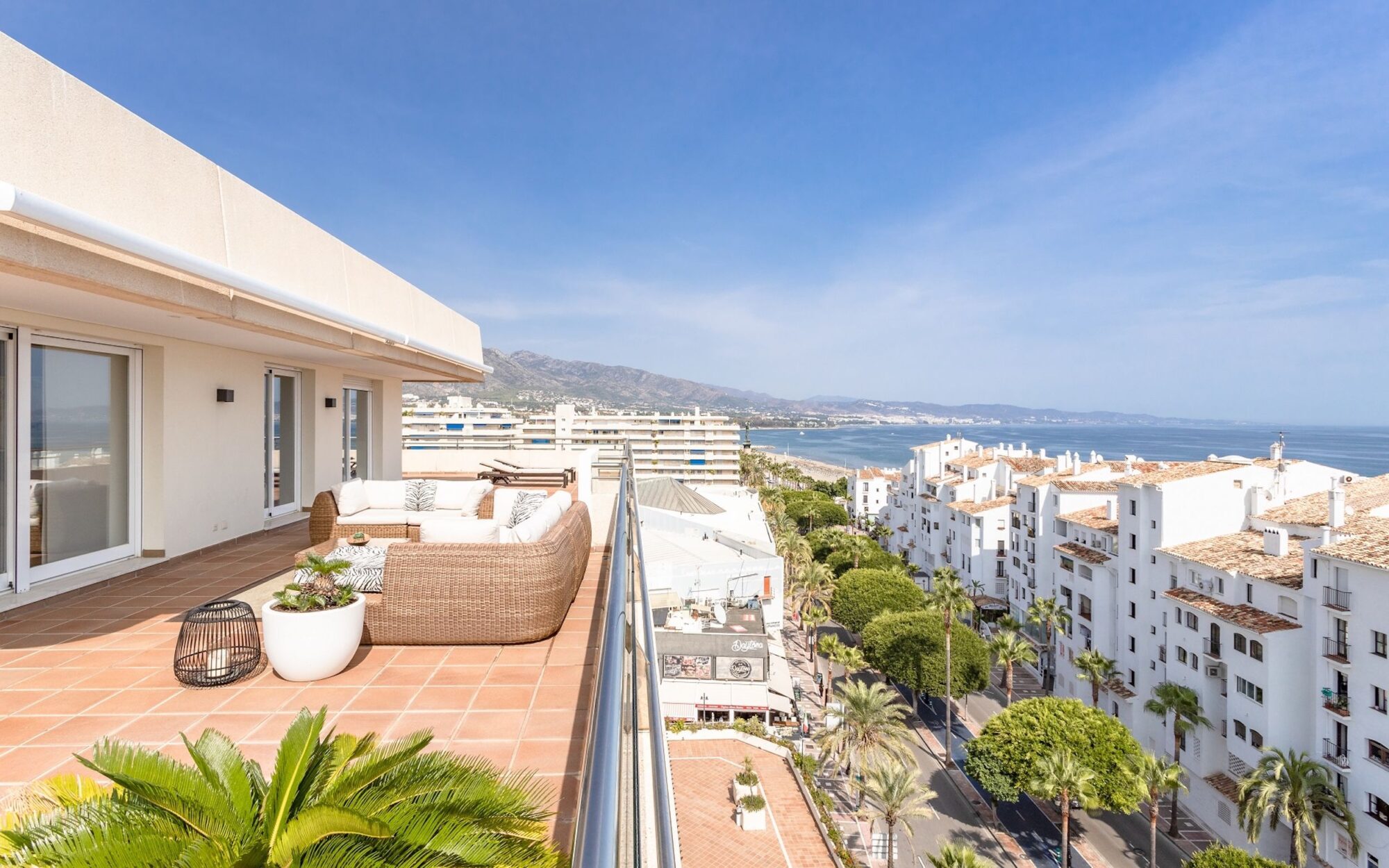The Ultimate Guide to Renting in Marbella
Last Updated: Tuesday, July 29, 2025
5 Essential Steps to Finding the Right Rental — with Confidence and Local Insight
Renting a home in Marbella is more than just securing a roof over your head—it’s about choosing a lifestyle, understanding the rhythm of the seasons, and knowing how to position yourself in a competitive market. With fluctuating prices between high and low seasons, distinct rental laws in Spain, and the unique characteristics of each neighborhood—from lively Puerto Banús to the charming calm of El Rosario—making the right choice can feel overwhelming. This step-by-step guide is built to give you clarity. Whether you’re relocating, working remotely, or spending a season in the sun, we’ll help you navigate Marbella’s rental landscape with insight, strategy, and ease.
Marbella Rental Trends Worth Knowing
+35%
Seasonal Price Surge
€2,300
Avg. 2-Bedroom Rent
62%
Long-Term Appeal
Understanding Marbella’s rental landscape starts with three key figures that define the rhythm of the market. First, summer prices surge by an average of 35%, making timing a critical factor in your search. This seasonal demand is driven by tourism, leaving long-term renters competing with short-term holiday lets during peak months. Second, expect to pay around €2,300/month for a 2-bedroom apartment in top-tier neighborhoods like Nueva Andalucía, Puerto Banús, or the Golden Mile—though prices can swing widely depending on the view, amenities, and proximity to the coast. Finally, with 62% of renters opting for long-term contracts, it’s clear that Marbella is attracting more digital nomads, remote professionals, and year-round residents. These shifts shape availability, competition, and the overall experience of renting in Marbella.
Step 1: Understanding the Marbella Rental Market
Marbella’s rental market is dynamic, driven by a blend of tourism, international residents, and a strong demand for seasonal luxury properties. One of the most important things to understand as a renter is the seasonality of pricing. Rent for the same apartment can differ drastically depending on when you sign your lease. A beachfront flat in Puerto Banús that goes for €2,800/month in July might be available for €1,800 in January.
This fluctuation is largely due to the influx of summer visitors and a sharp increase in short-term holiday lets that crowd out long-term inventory. To avoid inflated rates, the best time to secure a long-term rental is between October and April—when competition is lower, and landlords are more open to negotiation.
The second major factor shaping your rental experience is neighborhood selection. Marbella is not a single market but a patchwork of micro-markets, each with its own pricing, vibe, and lifestyle offering. Nueva Andalucía, known for its golf courses and modern apartments, is ideal for young professionals and expats, while areas like Elviria or El Rosario offer more space and better year-round pricing for families. Old Town Marbella appeals to those wanting authentic charm, while Sierra Blanca and the Golden Mile cater to luxury-focused tenants.
Choosing your neighborhood isn’t just about price—it’s about proximity to schools, beach access, nightlife, and the type of community you want to be part of.
Marbella Neighborhood Snapshot
| Neighborhood | Avg Rent (2BR) Low Season |
Avg Rent (2BR) High Season |
Best For |
|---|---|---|---|
| Puerto Banús | €2,000 | €2,800 | Nightlife, Shopping |
| Nueva Andalucía | €1,800 | €2,300 | Expats, Golf |
| Elviria | €1,400 | €1,800 | Families, Schools |
| Marbella Old Town | €1,500 | €1,900 | Culture, Walkability |
| Golden Mile | €2,600 | €3,200 | Luxury, Beach Access |
Best International Schools in Marbella for Families
For families relocating to Marbella, access to top-tier education is a key consideration. The city is home to some of the most prestigious international schools in Spain, offering British, American, and IB curricula. The highest concentration of elite schools can be found in Nueva Andalucía and along The Golden Mile, making these areas especially attractive to families with children.
One standout is Swans International School, located on the Golden Mile. It was recently awarded the title of the Top IB (International Baccalaureate) School in Spain, further solidifying Marbella’s reputation as an educational hub for international families.
Top International Schools in Marbella
| School Name | Curriculum | Location |
|---|---|---|
| Swans International School | British + IB | The Golden Mile |
| Aloha College Marbella | British + IB | Nueva Andalucía |
| The British International School of Marbella | British (EY–Year 9) | East Marbella |
| Laude San Pedro International College | British (IGCSE + A-level) | San Pedro de Alcántara |
| Sotogrande International School | IB (PYP–DP) | Sotogrande (40 mins) |
| The American College in Spain | U.S. Curriculum (Grades 11–12 + University Pathway) | Nueva Andalucía |
Note: In Spain and many British curriculum schools abroad (including Marbella), “college” doesn’t refer to university but rather to primary and secondary schools — often serving children from ages 3 to 18. Additionally, all international schools in Marbella are private and require tuition. There are no public international schools in the region.
How Rental Prices Have Grown: Marbella’s 5-Year Trend
Over the past five years, Marbella has experienced steady rental price growth, reflecting both rising demand and the area’s premium lifestyle appeal. In 2019, the average monthly rent for a 2-bedroom apartment was €1,300. Prices dipped slightly in 2020 to €1,250, likely due to pandemic-related travel restrictions. Since then, the market has rebounded impressively—rising to €1,350 in 2021, €1,450 in 2022, and €1,550 in 2023. As of 2024, renters are paying an average of €1,650 per month, marking a 27% increase since 2019.
This consistent upward trend is crucial for both seasonal renters and long-term tenants to understand when budgeting or timing their lease.
Who’s Renting in Marbella? A Look at 2024 Demographics
Understanding who’s renting in Marbella helps shape smarter decisions—whether you’re searching for a long-term lease or a seasonal home. In 2024, expats make up the largest share of renters (35%), followed by a growing community of remote workers and digital nomads (25%) who are choosing Marbella for its lifestyle and connectivity. Seasonal tourists (20%) still play a strong role in the market, particularly during summer months, while long-term locals (20%) round out the landscape.
These insights reveal a dynamic, international rental market—and knowing your fellow renters helps you better position yourself when securing the right property.
When Demand Peaks: Monthly Rental Trends in Marbella
Marbella’s rental market follows a distinct seasonal rhythm, and understanding it can help you time your move wisely. As shown in the chart, rental demand begins rising in March (60) and accelerates into the high season, peaking in July and August at index 100. Demand starts to cool in September (80) and returns to baseline levels by November (50) and December (45). This cyclical behavior reflects Marbella’s popularity among summer holidaymakers and second-home seekers.
If you’re looking for value and flexibility, consider planning your rental search between November and February, when competition is lower and prices are more negotiable.
Step 2: Know Your Rental Rights & Responsibilities
Navigating rental agreements in a foreign country can feel overwhelming, but understanding your rights as a tenant in Spain—and your responsibilities—empowers you to rent with confidence. Spanish rental law (LAU – Ley de Arrendamientos Urbanos) governs most long-term rental contracts and offers protections for both landlords and tenants. For instance, standard long-term leases in Spain are typically five years (or seven if the landlord is a legal entity), with the right to renew annually unless otherwise agreed. Tenants also have the right to remain in the property during this term unless there is a legal cause for eviction, and any rental increase must comply with regulated limits.
From a responsibility standpoint, tenants are expected to care for the property, cover minor maintenance (like replacing lightbulbs or unclogging drains), and pay utilities unless otherwise negotiated. Deposits are commonly one to two months’ rent, and they must be returned if the property is left in good condition. It’s also important to ensure your rental agreement is registered and in writing, as informal agreements can lead to complications, especially in disputes.
Understanding Lease Types in Marbella’s Rental Market
In Marbella, rental agreements come in several forms, each suited to different renter profiles. Long-term leases (12+ months) make up the largest share of the market at 40%, offering stability and legal protections ideal for residents and expatriates. Mid-term rentals (3–11 months) follow at 25%, often chosen by digital nomads, seasonal workers, or students. Vacation rentals, which operate on a daily or weekly basis, make up 20% of the market, particularly during the high season. Lastly, short-term leases (1–3 months) account for 15%, typically serving people in transition or those testing the area before committing.
Knowing the prevalence of each lease type helps align your rental expectations with market norms and availability.
Your Rights as a Tenant — and What Your Landlord Owes You
Renting a property in Marbella means more than just signing a contract—it’s about understanding your legal protections and what to expect from your landlord. Under Spain’s LAU (Urban Leasing Law), long-term tenants have the right to remain in the property for up to five to seven years, depending on the type of landlord, with rent increases tied to legal limits. You’re also protected against unjust eviction and entitled to a written lease, proper notice, and the return of your deposit if the property is left in good condition. At the same time, landlords are responsible for keeping the home habitable, handling major repairs, and respecting your privacy. This balanced framework helps ensure a smooth, secure rental experience for both parties.
Tenant Rights vs. Landlord Responsibilities
| Tenant Rights | Landlord Responsibilities |
|---|---|
| Right to remain in the property for 5–7 years (depending on landlord type) | Provide a habitable, legally registered property |
| Rent increases must comply with legal limits (usually tied to inflation) | Handle structural repairs and major maintenance (roof, plumbing, electrical) |
| Right to early termination (with proper notice) after 6 months | Return security deposit if no damage beyond normal wear-and-tear |
| Protection against unjust eviction | Respect tenant privacy and give notice before entering the property |
| Right to receive a written rental contract | Register the rental contract if required by local regulations |
| Refund of deposit within 30 days of move-out if conditions are met | Provide official receipts or proof of rent payment |
Step 3: Budgeting & Total Cost Planning
Before signing any rental agreement in Marbella, it’s essential to understand your total monthly and move-in costs. While the advertised rental price might seem reasonable, you’ll want to factor in additional expenses like utilities, community fees, and deposits. Long-term rentals typically require a one-month security deposit, while furnished or luxury properties may ask for more. Some landlords even request advance payment (first and last month’s rent) or additional guarantees, especially for non-residents or remote workers without local employment history.
You should also plan for seasonal fluctuations. For example, electric bills spike in the summer due to air conditioning, and rental prices surge during high season (May–September). If you’re here short-term, expect higher costs for flexibility and fully furnished spaces. Long-term tenants can often negotiate more favorable terms but should prepare for annual rent increases, which are often tied to inflation indices. Smart budgeting helps avoid surprises and ensures you’re fully prepared to commit to your ideal Marbella lifestyle.
Understanding Deposits & Upfront Payment Expectations in Marbella
In most rental markets across Spain, it’s typical to pay a security deposit equivalent to one or two months’ rent, plus an agency fee of one month. However, Marbella operates differently, especially when dealing with international renters or expats without long-term local ties. While this may seem unusual, it’s considered a safeguard by landlords to reduce risk, especially for high-end or luxury properties. It’s not uncommon for expats, digital nomads, or remote workers to be asked for larger upfront payments — not as a red flag, but as part of Marbella’s fast-moving and owner-driven rental culture.
Because of Marbella’s seasonal appeal and high demand for premium rentals, landlords often request between 2 to 4 months upfront — and in some cases, even 6 to 12 months of rent in advance. This is particularly common when the tenant does not yet have a job contract in Spain, local references, or a long-term residency history.
Typical Deposit & Upfront Costs in Marbella Rentals
| Renter Profile | Typical Upfront Requirement |
|---|---|
| Local Resident | 2 months deposit + 1 month agency fee |
| Expats / New to Spain | 3–4 months deposit + agency fee |
| High-End or Luxury Rentals | 6–12 months rent upfront (negotiable) |
Tip: Before committing, always clarify total upfront costs. Request a full breakdown that includes security deposit, agency fees, and any advanced rent payments. If the sum seems excessive, try negotiating a phased payment plan, especially for rentals beyond the €2,000/month range.
How Monthly Rental Costs Are Typically Allocated in Marbella
Understanding the true cost of renting in Marbella goes beyond just the advertised rent. On average, 70% of your monthly housing budget will go toward base rent, but other essential expenses can quickly add up. Utilities like electricity and water (especially with air conditioning in summer) often account for 15%, while Wi-Fi, and miscellaneous costs such as insurance or regular cleaning round out the remaining 15%. Factoring these in upfront will give you a more accurate picture of your monthly financial commitment—and help avoid surprises after you move in.
Monthly Utility Cost Trends in Marbella Rentals (2024)
Utilities in Marbella can vary significantly depending on the season. In summer, electricity costs surge due to air conditioning, pool pumps, and increased appliance use. Winter may see a moderate spike in heating bills, especially in homes without modern insulation. This chart illustrates the monthly average utility costs—covering electricity and water—based on real tenant reports from across Marbella in 2024. As seen below, utility bills peak from June through August, with electricity costs climbing up to €160/month, compared to €80–€100 in cooler months. Factoring this into your rental budget is crucial, especially if you plan to stay during the high season.
Average Monthly Living Costs by Marbella Neighborhood
Understanding the average monthly rental expenses by neighborhood is key to planning your budget effectively in Marbella. This breakdown includes estimated rent, utilities, internet/TV, and cleaning or maintenance services — all of which vary by location. From the luxury of Puerto Banús to the more residential feel of San Pedro, this guide helps renters compare total expected costs at a glance.
Average Monthly Rental Costs by Neighborhood
| Neighborhood | Rent | Utilities (Elec. & Water) |
Internet / TV | Cleaning / Maintenance | Total Avg Monthly |
|---|---|---|---|---|---|
| Nueva Andalucía | €2,500 | €130 | €45 | €100 | €2,775 |
| Puerto Banús | €3,200 | €150 | €50 | €120 | €3,520 |
| Marbella Centro | €1,800 | €120 | €40 | €80 | €2,040 |
| Elviria | €2,000 | €125 | €45 | €90 | €2,260 |
| San Pedro de Alcántara | €1,600 | €115 | €40 | €75 | €1,830 |
Transportation Costs & Lifestyle Considerations
In Marbella, transportation is more than a matter of convenience—it’s a lifestyle factor that can significantly impact your monthly budget. Where you choose to rent will influence how much you rely on cars, taxis, or ride-sharing services. If you’re based centrally in Marbella Centro or near hotspots like Puerto Banús, walking and quick rides with Uber or Bolt may suffice. However, more residential areas such as Nueva Andalucía, Elviria, or San Pedro de Alcántara often require a personal vehicle for daily comfort and flexibility.
For those without their own car, Marbella offers several flexible mobility solutions. Revel and Bipi are trusted long-term car rental providers with a range of models—including high-end options—available on monthly subscription plans. If luxury is part of your lifestyle, local agencies also offer premium and exotic car rentals, perfect for seasonal stays or entertaining guests. Chauffeur services are also widely available across the coast.
It’s also important to account for parking when building your rental budget. Not all properties come with dedicated parking, and securing a covered or assigned spot can add between €50 to €150 per month, depending on location. Long-term car rentals begin at around €500/month, but luxury options will cost more. When you factor in fuel, insurance, maintenance, and potential tolls, transportation becomes a key line item in your overall cost of living in Marbella.
Budget Checklist for Renting in Marbella
When planning your move to Marbella, budgeting effectively is essential—not just for monthly rent, but for the many upfront and ongoing costs that can affect your overall quality of life. The rental market here operates differently than in other parts of Spain or Europe, especially for non-residents or expats. It’s common to encounter higher upfront deposit requirements, agency fees, and variable utility costs influenced by seasonality and property location.
Transportation and parking can also significantly impact your lifestyle and monthly expenses, especially if you’re living outside the city center. From luxury vehicle rentals through local providers like Revel and Bipi to everyday essentials like Wi-Fi and renter’s insurance, these are the items you need to factor into your monthly and upfront budget to avoid surprises—and ensure a smooth, stress-free rental experience in Marbella.
Rental Budgeting Essentials
| Budget Item | Details / Range | Notes |
|---|---|---|
| Security Deposit | 2–6 months’ rent | Up to 12 months for non-residents or expats |
| Agency Fee | 1 month’s rent | Paid upfront; non-refundable |
| Utilities | €100–€180/month | Electricity and water |
| Internet / TV | €30–€60/month | Fiber and IPTV bundles common |
| Cleaning & Maintenance | €60–€120/month | Common for mid- to high-end rentals |
| Transportation | €500–€800/month (car rental) | Premium options: Revel, Bipi, luxury rental firms |
| Parking | €50–€150/month | Not all rentals include parking |
| Insurance | €10–€25/month | Liability and content coverage |
| Initial Setup & Misc. | €100–€300 (one-time) | Cleaning, appliance rental, setup costs |
Step 4: Navigating the Viewing & Application Process
Once you’ve identified properties that match your budget, lifestyle, and preferred neighborhoods, it’s time to move into the viewing and application phase—a critical point where preparation, timing, and professionalism can make all the difference.
Viewings in Marbella can be highly competitive, especially during peak seasons when demand is elevated. It’s important to schedule viewings promptly and arrive on time. Be observant during the tour—take note of natural light, noise levels, appliance conditions, and even mobile signal strength. If parking or storage is important to you, confirm exactly what’s included in the rental. In Marbella, some rentals include furnished outdoor terraces, shared pools, or even concierge service, but these perks vary drastically from home to home.
Once you find a place you love, be prepared to act fast. The application process typically requires documentation such as proof of income or employment, bank references, a copy of your passport or NIE (Número de Identificación de Extranjero), and a signed reservation or holding agreement. If you’re an expat or self-employed, landlords may ask for additional guarantees, such as a higher upfront deposit or proof of income for several months.
What to Expect: Timeline from Viewing to Move-In
In Marbella, the rental process can move quickly—especially during high season or for sought-after properties. On average, you can expect a timeline of around 17 days from your initial property viewing to moving into your new home. Typically, viewings are scheduled within the first 2 days, followed by offer negotiations which are usually finalized by day 7. Gathering and submitting the necessary documents takes about 3 more days, with lease drafting and legal review bringing the process to day 14. Most tenants sign their contract by day 16, with move-in occurring around day 17. Being prepared with all necessary documents and understanding these timeframes can help streamline the process and secure your ideal rental efficiently.
Most Requested Documents by Landlords
When applying for a rental property in Marbella, especially as an expat or non-resident, landlords often require a series of documents to assess your reliability as a tenant. Being prepared with a complete application not only speeds up the rental process but also makes you a more competitive candidate in a fast-moving market.
Commonly Requested Documents
| Document | Purpose / Notes |
|---|---|
| Passport or NIE | Valid identification (NIE is required for long-term rentals). |
| Proof of Income or Employment | Recent payslips, an employment contract, or proof of self-employment/freelance. |
| Bank Statements (3–6 months) | Demonstrates financial stability and ability to meet monthly rent obligations. |
| Reference Letter from Employer | Optional but helpful, especially if relocating from abroad. |
| Rental History / References | References from previous landlords or a record of past leases. |
| Proof of Funds (for upfront payment) | Especially important if you’re offering 6–12 months rent in advance. |
| Credit Report | Rare, but some landlords may request this if you’re applying for a premium rental. |
| Residency Status / Visa | Required for non-EU applicants staying more than 90 days. |
Tip: For luxury or long-term rentals, some landlords may request additional guarantees, such as a Spanish guarantor or bank guarantees. It’s best to ask ahead and clarify expectations.
Why a Spanish Bank Account Matters for Renters
Having a Spanish bank account is more than a convenience—it’s a necessity for most renters in Marbella. Essential services like electricity, water, and internet typically require payment via direct debit from a local account. Without one, tenants may encounter delays in setting up utilities or face outright refusal of service. Opening a Spanish bank account should be one of your first administrative tasks when planning a long-term rental in Spain.
In addition to utilities, landlords and rental agencies often require rent payments to be made from a Spanish account to streamline transactions and ensure timely payments. It also simplifies financial management for tenants, eliminating currency conversion fees and allowing easy setup of recurring payments for expenses like cleaning or maintenance. Popular banking options for newcomers include BBVA, Santander, CaixaBank, and online-friendly options like Sabadell.
Understanding Spanish Lease Terms (Urban Rental Law – LAU)
Navigating a rental agreement in Spain means understanding the legal framework that governs residential leases—most notably the Ley de Arrendamientos Urbanos (LAU). This law defines the rights and obligations of both tenants and landlords. Whether you’re renting short-term or planning a multi-year stay, it’s crucial to be familiar with the language and expectations laid out in your lease.
10 Key Lease Terms Under LAU
Duración del contrato (Contract Duration)
Standard residential leases are often set for a minimum of 12 months and may include automatic extensions up to 5 years (7 for corporate landlords).
Fianza (Security Deposit)
Typically equivalent to one month’s rent for residential leases, though landlords may request additional guarantees.
Renta (Monthly Rent)
The agreed-upon amount to be paid monthly, which may include annual updates based on Spain’s Consumer Price Index (IPC).
Revisión de la renta (Rent Review/Adjustment Clause)
Specifies how and when the rent can be updated—usually annually in accordance with inflation.
Obras y reparaciones (Repairs and Maintenance)
Tenants are responsible for minor repairs; landlords must handle structural or essential system issues unless the tenant causes damage.
Gastos (Expenses)
Clarifies who pays for utilities, community fees, garbage tax, and other ongoing costs. Always check if these are included or billed separately.
Desistimiento (Early Termination)
Tenants may legally exit a lease after 6 months with 30 days’ notice. Penalties may apply if this clause is not properly included.
Prórroga tácita (Tacit Renewal)
If neither party gives notice to end the contract, the lease may be automatically renewed under the same terms.
Subrogación (Transfer of Lease)
Describes the conditions under which the lease can be transferred, such as in the event of death or family changes.
Uso de la vivienda (Use of Property)
Limits usage strictly to residential purposes. Commercial use or subleasing without written consent is generally prohibited.
Navigating the documentation and legal expectations of renting in Marbella doesn’t have to be daunting—especially when you’re prepared. From gathering the right paperwork to understanding your rights as a tenant, taking the time to organize this step properly can prevent delays and complications later on. Whether you’re a local or an international renter, having a clear picture of what’s typically required—and why it matters—sets you up for a smooth and confident move-in process.
Step 5: Finalizing Your Rental and Moving In
Once your documents are in order and the contract is signed, it’s time to handle final payments and prepare for the move. This stage involves confirming your deposit and rent payment have been received, utility accounts are transferred or opened in your name, and verifying access to keys, parking, and communal amenities. In Marbella, many landlords expect a smooth transition—this includes ensuring all administrative steps are completed before your official move-in date.
Equally important is your physical move. Whether you’re relocating from abroad or from within Spain, we recommend coordinating early with reputable moving services, especially during peak seasons. Take note that in urban zones like Marbella Centro or Puerto Banús, access to the property can sometimes be restricted or congested, requiring planning for parking or lift usage. For those new to the area, we also suggest taking time to explore your local neighborhood—identify nearby supermarkets, pharmacies, gyms, and public transport options so your first weeks feel more settled.
Move-In Preparation Timeline
| Task | Week -4 | Week -3 | Week -2 | Week -1 | Move-In Week | Week +1 |
|---|---|---|---|---|---|---|
| Open Spanish bank account | ✔ | |||||
| Submit guarantor/bank paperwork | ✔ | |||||
| Review and sign rental contract | ✔ | |||||
| Pay deposit and first month’s rent | ✔ | |||||
| Arrange utility setup (electricity, water, internet) | ✔ | ✔ | ||||
| Schedule movers or transport | ✔ | ✔ | ||||
| Conduct inventory with landlord | ✔ | |||||
| Register new address with local authorities | ✔ | |||||
| Inspect the home and sign-off handover | ✔ | |||||
| Begin unpacking and settling in | ✔ |
Ready to Rent Smarter in Marbella? Let’s Get Started.
Finding the right rental in Marbella is more than just securing a place to live—it’s about choosing a lifestyle that fits your needs, budget, and long-term goals. From understanding seasonal price shifts and neighborhood dynamics to navigating legal requirements and budgeting for hidden costs, being informed is your greatest advantage. With this guide, you’re equipped to approach the Marbella rental market with clarity and confidence.
Whether you’re relocating, investing in a second home, or simply chasing the Mediterranean dream, CA Estates is here to help you every step of the way. Let’s make your move seamless—reach out to start your rental journey today.
Sources:

Carin Astrup - Real Estate Agent
Fluent in Swedish, English, Danish, and Norwegian, Carin Astrup works with an elite international clientele, expertly matching buyers and investors with some of Marbella’s most exclusive properties.
Ready to find your dream home or make a smart investment in Marbella? Contact Carin today for a private consultation and unlock access to the Costa del Sol’s finest properties.

